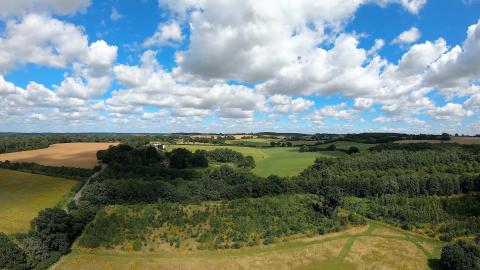
C-BASC's mission
Interactions between agricultural and food systems, climate, and biodiversity are at the heart of the social, economic and environmental transitions needed to meet international, national and local sustainability goals.
These interactions have begun to receive considerable attention as a key sustainability nexus where trade-offs need to be recognized and avoided where possible, and where synergistic solutions are identified and implemented. Food systems – including agricultural production, transformation, distribution and consumption – are under tremendous pressure to provide food for a growing and more affluent population. At the same time, agriculture and food systems are also under tremendous pressure to become more sustainable because they are the primary driver of biodiversity loss at global and regional scales, a major contributor to climate change and a significant source of air, water and soil pollution. Climate change will add to pressures on biodiversity and agriculture because it is projected to become a primary driver of biodiversity loss in the next few decades and have increasingly large impacts on agriculture and food systems. As such, strong climate mitigation and adaptation measures are essential, and land-based measures can play a major role. But land-based mitigation and adaptation measures can have positive or large detrimental effects on biodiversity and food security. Importantly, biodiversity must be viewed as more than just a conservation issue, because biodiversity can make major contributions to sustainable agriculture, to climate adaptation and mitigation, and to reducing air, soil and water pollution.
At the international level, the ambition of C-BASC is to contribute to the study and implementation of the United Nations’ 2030 Agenda on Sustainable Development and the European "Green Deal".

The UN Sustainable Development Goals related to food, climate and biodiversity are reflected in four of the main elements of the recently adopted "Green Deal" of the European Union:
- Farm-to-Fork: designing a fair, healthy and environmentally-friendly food system,
- Preserving and restoring ecosystems and biodiversity,
- A zero pollution ambition for a toxic-free environment and
- Increasing the EU’s climate ambition for 2030 and 2050.
We aim to contribute to each of these individual elements, but also to the more difficult task of identifying and implementing coherent policies and strategies across multiple sustainability goals.
At the national level, the objective of C-BASC is to contribute to the study and implementation of two high-level policy, research and innovation objectives: the "ecological transition" and the "agroecological transition".
Key elements of these interrelated transitions are the recognition that degradation of the environment is a serious problem, transformative change across all facets of society is urgently needed to address multiple environmental crises, and transformative change must address issues of economic and social justice. These transitions are of sufficiently high national policy priority that the French environmental ministry is titled the "Ministry of the Ecological Transition" and the agroecological transition is one of the main policy objectives of the agriculture ministry. The research strategies of our parent institutions reflect these high priorities. The terms "ecological transition" and "agroecological transition" are highly polysemic, so it is important to define them and be explicit about the elements of these transitions addressed in C-BASC.
Ecological transition
The "ecological transition" is defined in French environmental policy as an evolution towards a new economic and social model of sustainable development that renews our ways of consuming, producing, and living together to meet the major environmental challenges of climate change, resource scarcity, the accelerated loss of biodiversity and the multiplication of environmental health risks. Within this broad context, C-BASC focuses on the facets related to protection and restoration of biodiversity, land-based climate mitigation, adaptation of organisms, ecosystems and socio-ecological systems to climate change, and reductions in pollution.
Agroecological transition
The agroecological transition is a closely related policy objective that is a vital component of achieving the ecological transition. C-BASC's contribution to the agroecological transition can be broadly defined as the integrative study and design of the transitions to sustainable agricultural and food systems that encompass environmental, economic and social dimensions. The science of agroecology has historically put an emphasis on the agricultural production, so one of our challenges is to bring together the agricultural production and the food system aspects of the agroecological transition. To this end, C‑BASC covers sustainable production, transformation, distribution, and consumption of food. The food system facets of our strategy focus on (i) changes in food consumption practices and their impact on the environment, (ii) design, production and distribution of foods with low environmental impact, iii) development of value for co-products in the logic of circular economy and (iv) identification of supply and demand levers to steer actors toward sustainable practices.
C-BASC, an interdisciplinary program of the university
Validated in 2021, C-BASC is an interdisciplinary program of the Université Paris-Saclay. Discover the mission of these interdisciplinary programs.

